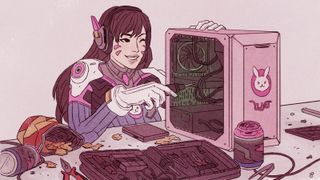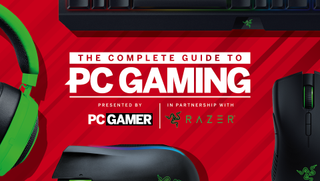Why PC gaming?
A moment of reflection on the gaming platform we love.

A few months ago I started using two mice: one for work, and one for gaming. The wrist pain I'd accumulated after typing and gaming for hours every day for a decade had finally caught up with me, and I needed to make an adjustment to my setup in order to avoid injury.
A clunky, ergonomic mouse became my implement for spreadsheets, Google Docs, and video conferences. In the evening I'd push it to the fringe of my mousepad and reach for my Logitech G5, the ancient glove I'd carried through two versions of Counter-Strike (so beloved is the out-of-print G5 that it goes for twice the original price on Ebay). It's an awkward setup: two mice on my extra large mousepad, both feeding data, competing for control over my cursor. But right now, it's what's right for me.
As a gaming platform, the PC remains the only place where we can have something that resembles a relationship with our hardware. This sense of control, the series of fine adjustments that are available to us to tweak or ignore, is evident to anyone that plays games on a computer. PCs, like some of our favorite open-ended games—Deus Ex, Dwarf Fortress, Divinity: Original Sin 2—trust us to figure it out ourselves.
The whole idea of modification is endemic to the hobby.
Even if you bought your rig pre-built or you're on a laptop, over time, you start listening to the thing. You realize that you're not playing on a black box. You notice when the boot time is a little off, when your case fans are spinning at 100 percent, when your framerate's hitching after a new patch. You'll modify its behavior to make it work better for you, asking it to turn off the monitor more quickly to shrink your energy bill, or maybe you'll find some noise-cancelling foam to make your livestreaming setup that much crisper.
PC gaming is a craft we practice. It's a rich hobby with its own traditions, and its own long-running debates (AMD or Nvidia; watercooling or air cooling; Quake or Unreal?). Through the sum of that, PC gaming gives us the choice to be more than passive consumers of entertainment, but active participants in making our own fun. Modders are sometimes characterized as a fringe faction of hyper-enthusiasts, but really the whole idea of modification is endemic to the hobby—modders just happen to be prolific champions of the behavior we all share.

PC Gamer is going back to the basics with a series of guides, how-tos, and deep dives into PC gaming's core concepts. We're calling it The Complete Guide to PC Gaming, and it's all being made possible by Razer, which stepped up to support this months-long project. Thanks, Razer!
PC gaming's proximity to the larger internet empowers that fun-making further. Our in-game experiences bleed outward into communities, where discussion, troubleshooting, easy file sharing, and organizing on Discord, Reddit, Battle.net, or Tom's Hardware are all an Alt + Tab away. Half of EVE Online happens outside the .exe itself, on message boards or in DMs where the next war, heist, or act of cosmic immorality is being planned right now so it can become another fabulous story.
Part of our job is to evangelize this stuff, to say, correctly, that PC gaming has never been more vibrant, accessible, affordable, and good. But as this neverending golden age continues, we also have a duty to acknowledge the problems that have come along with it.
The biggest gaming news, reviews and hardware deals
Keep up to date with the most important stories and the best deals, as picked by the PC Gamer team.
Valve's quiet monopoly over distribution has mostly put PC gaming in good hands, but the company continues to stumble through important stuff like content moderation. Microsoft helped found PC gaming, but it currently feels like PC gamers are in the middle of their third marriage with the company. When the craze of cryptocurrency pushed graphics card prices far above their retail price last year, it made it hard to recommend building a rig to all of my friends who wanted to jump into PUBG. Toxicity is a plague in plain sight that goes under-addressed by some of the largest competitive games and communities. And developers themselves, making games for some of those studios, face unstable, uncertain working conditions.
Our homemade technology has always come with a few headaches. The important thing is that we take responsibility for them, and empower each other to make this shared, open, independent platform we love better each year.

Evan's a hardcore FPS enthusiast who joined PC Gamer in 2008. After an era spent publishing reviews, news, and cover features, he now oversees editorial operations for PC Gamer worldwide, including setting policy, training, and editing stories written by the wider team. His most-played FPSes are CS:GO, Team Fortress 2, Team Fortress Classic, Rainbow Six Siege, and Arma 2. His first multiplayer FPS was Quake 2, played on serial LAN in his uncle's basement, the ideal conditions for instilling a lifelong fondness for fragging. Evan also leads production of the PC Gaming Show, the annual E3 showcase event dedicated to PC gaming.
Most Popular


